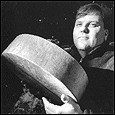
| Awards |
|
| Campus Authors |
|
| News Briefs |
|
| Staff Enrichment |
|
| Awards |
|
| Campus Authors |
|
| News Briefs |
|
| Staff Enrichment |
|
Randall Barnwell Brings World Music to the World
By Julia Sommer, Public Affairs
Posted January 20, 1999
 Randy Barnwell with a bendir -- a Moroccan frame drum. Peg Skorpinski photo. |
Life took an unexpected turn for musician Randall Barnwell, administrative assistant in Plant & Microbial Biology, when he discovered the short stories of American expatriate Paul Bowles in 1984.
"Bowles is a master at creating the setting, emotions and atmosphere of a place," says Barnwell. "The way he described Morocco, on so many levels, made me want to be there."
At the time, Barnwell was an analyst at Blue Cross/Blue Shield in Boston and bass player in an "alternative post-punk" band with a recording contract.
He established a correspondence with Bowles, who has lived in Tangier, Morocco, since 1947, and Bowles invited him to visit.
There, Barnwell fell in love with Moroccan music and culture and made his first three CD recordings for Istikhara Music Co., which he founded in 1987. (The name "Istikhara," which Barnwell found in a Bowles story, refers to an Islamic supplication to Allah.)
The first CD combines Bowles reading his stories and poetry, Bowles' ethnological recordings of Moroccan music, and a Belgian pianist playing Bowles compositions.
The second features Bowles reading the stories of Moroccan storyteller and artist Mohammed Mrabet, and the third is Moroccan trance music.
Barnwell's interest in Moroccan music led to a deeper involvement in the country's culture. In order to find, get to know, and record Moroccan musicians and storytellers, Barnwell learned to speak Maghrebi Arabic fluently. He converted to Islam in order to marry a Moroccan woman. And he has tracked down Saharan musicians by donkey and recorded their work in mini studios he set up in desert tents.
Barnwell's biggest hit to date is "Morocco: Crossroads of Time," which has sold about 90,000 copies. Due out this spring from Istikhara are "A Starry Night in the Western Sahara" and the double CD, "World of Gnawa." The former features songs from the war zone between the Western Sahara, Mauritania and Morocco.
Istikhara CDs are marketed and distributed around the world by Rounder Records in Boston, the premier distributor of world music. After covering expenses, Barnwell pays his recording artists 50 percent of proceeds -- highly unusual in the world music business, he says, where poor, illiterate musicians are often exploited.
"Other record companies don't respect them," Barnwell says. "We're more interested in the artistic, cultural aspects of recording."
Several musicians discovered and recorded by Barnwell have gone on to performing careers. "We like to help people get meaningful jobs in their craft rather than see talented artists end up as busboys or taxi drivers," he says.
After mining the music of North Africa, Barnwell turned his attention to the music and storytelling of Thailand, Burma and Malaysia, moving west in 1996 in part to be closer to Asia.
Barnwell's involvement in world music has also spawned relationships with campus faculty. Currently he's producing a CD for an Israeli Jewish-Arab band introduced to him by Ben Brinner, associate professor of music. He hopes to record a group in Indonesia discovered by Amin Sweeney, professor of Malaysian and Indonesian Studies.
How does Barnwell manage to run a world music company while working full-time on campus? He gets a lot of help from his current wife, a Japanese woman he met via email while setting up a recording project in Thailand, and he makes full use of the Internet.
"I'm like a construction foreman -- I find the right person for each job; I have contacts all over the world," he says. "And I like to stay busy."
The Istikhara Music Co. website can be found at www.istikhara.com.
![]()
![]()
January 20 - 26, 1999 (Volume 27, Number 19)
Copyright 1999, The Regents of the University of California.
Produced and maintained by the Office of Public Affairs at UC Berkeley.
Comments? E-mail berkeleyan@pa.urel.berkeley.edu.